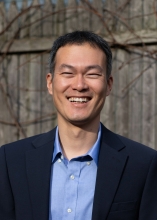Jongmin Kim, PhD

Department of Biomedical Sciences
Assistant Professor
Department of Biomedical Sciences
Cornell University College of Veterinary Medicine
T7 006C Veterinary Research Tower, Box 17
Ithaca, NY 14853-6401
Phone: 607-253-3421
Email: jk2938@cornell.edu
Research Interest
We perform genetic studies on chromatin factors required to prevent the misexpression of inappropriate genes in the spermatogenesis of flies and mice. We are specifically interested in the roles of the Kumgang-CHD4 complex and Polycomb complexes and their distinct mechanisms, yet conserved roles in safeguarding germ cell fate.
A cell uses only a subset of its genes to establish and maintain its identity. However, in pathological conditions, such as cancer and aging, transcription can be indiscriminately initiated from incorrect genes or non-coding loci. This aberrant transcription can drive tumorigenesis and tissue function decline during aging. Thus, mechanisms to block inappropriate gene expression are crucial for human health.
We employ spermatogenesis in flies and mice as a model to understand the fundamental mechanisms of transcriptional fidelity. Spermatocytes in the testes transcribe the most widespread regions of the genome compared to all other cell types in the body. Spermatocytes possess a unique chromatin structure, and many testis-specific genes are regulated by short regulatory sequences. Given the permissive state of the genome, repression mechanisms play outsized roles in preventing unwanted genes from being transcribed. Thus, the male germ line will be the uniting principal model for our lab, and we will employ both fly and mouse models to utilize the unique advantages of each system.
Teaching Interest
TBD
Education
- PhD - Chemical and Systems Biology, Stanford University (Advisor: Minx Fuller)
- BS - Life Science, Pohang University of Science and Technology (POSTECH)
Biography/Professional Experience
• 2024-present: Assistant Professor, Department of Biomedical Sciences, Cornell University
• 2016-2024: Research fellow, Department of Molecular Biology, Massachusetts General Hospital & Department of Genetics, Harvard Medical School (Advisor: Bob Kingston)
To expand his expertise in the molecular understanding of chromatin-modifying complexes, Jongmin joined Bob Kingston's group, known for chromatin biochemistry. During his postdoc, Jongmin investigated the function of canonical Polycomb Repressive Complex 1 (cPRC1), focusing on the paralog switching of CBX components of cPRC1 in mouse spermatogenesis. He showed that the expression and function of one paralog, CBX2, are specific to spermatogonial stem cell to progenitor transition and required for proper shutdown of the stem cell program. He also demonstrated that the positive charge in CBX2, previously shown to be critical for chromatin compaction in vitro, is crucial for long-term germ cell maintenance.
• 2015-2016: Postdoctoral fellow, Department of Developmental Biology, Stanford University (Advisor: Minx Fuller)
• 2008-2015: Graduate researcher, Department of Chemical and Systems Biology, Stanford University (Advisor: Minx Fuller)
During his PhD, Jongmin identified a spermatocyte-specific protein required for preventing cryptic promoter usage in flies. By developing an in vivo synchronized differentiation assay and follow-up genetic screens, he identified several genes critical for making sperm. One of those genes, Kumgang, was essential to block gene expression initiated from cryptic promoters in spermatocytes by restricting the activity of a promiscuous activator. This discovery showed the surprising potential of the spermatocyte genome for non-canonical gene activation and identified critical regulators preventing indiscriminate gene activation.
• 2007-2008: Research Technician, interdisciplinary Bioscience & Bioengineering program, POSTECH (Advisor: Daehee Hwang)
Jongmin established his foundation for genome-scale data analyses by working as a lab technician in a primarily computational biology lab. He worked on the interactions between tumor-resident bacteria and solid tumors.
Professional Publications
- JJ Kim, ER Steinson, MS Lau, DG de Rooij, DC Page, RE Kingston (2023) Cell type-specific role of CBX2 and its disordered region in spermatogenesis, Genes & Development 37 (13-14), 640-660
- JJ Kim, RE Kingston (2022) Context-specific Polycomb mechanisms in development, Nature Reviews Genetics 23 (11), 680-695
- J Kim, RE Kingston (2020) The CBX family of proteins in transcriptional repression and memory, Journal of biosciences 45, 1-8
- J Kim, C Lu, S Srinivasan, S Awe, A Brehm, MT Fuller (2017) Blocking promiscuous activation at cryptic promoters directs cell type–specific gene expression, Science 356 (6339), 717-721
A full list of my published work can be found in My Bibliography:
https://www.ncbi.nlm.nih.gov/myncbi/browse/collection/44193130/?sort=date&direction=descending
Awards and Honors
- 2019-2021: Urology Research Scholar, American Urological Association
- 2011-2014: Bruce and Elizabeth Dunlevie Stanford Interdisciplinary Graduate Fellowship (Full tuition and stipend)
- 2008-2011: Anne T. and Robert M. Bass Stanford Graduate Fellowship (Full tuition and stipend)
Professional/Academic Affiliations
- Member, American Urological Association (AUA)
- Member, Genetics Society of America (GSA)


